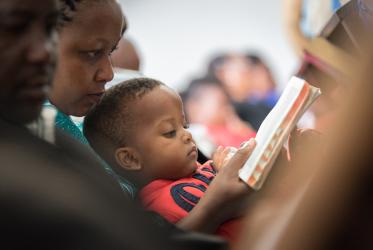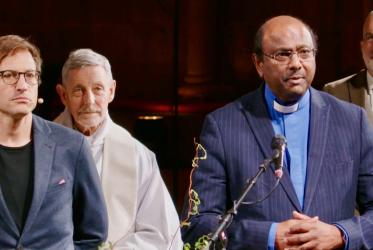News
Representatives of UN agencies such as the United Nations Children's Fund (UNICEF) and the World Health Organization (WHO) have spoken of how religious communities and churches can play a key part in ending violence in early childhood.
They were part of a side event during the UN Human Rights Council on March 8, International Women’s Day, at the Palais des Nations in Geneva. At it, they explained the intersection of UN agencies and civil society, including churches, on dealing with this scourge against young people at an early age.
The event was initiated by Arigatou International, co-sponsored by the EU permanent delegation to the UN in Geneva, and the diplomatic missions of Morocco, Mexico, Slovenia and Uruguay.
The co-organizers were: Arigatou International, World Vision, UNICEF, WHO and the UN Special Representative on Violence against Children along with the World Council of Churches (WCC).
Frederique Seidel, the WCC’s special advisor on child rights, moderated the panel on “this urgent issue”.
WCC-UNICEF cooperation
“Over two years the WCC and UNICEF facilitated a broad consultative process about the question ‘How can churches use their influence to improve children’s lives?’ It led to the ‘Churches’ Commitments to Children,’ which are now supported by over 200 churches and partners worldwide,” Seidel noted.
Marta Santos Pais, Special Representative to the UN Secretary-General on Violence Against Children said the presentation made it clear of the urgent need for prevention of violence in early childhood.
She said violence against children affects the whole of society.
“Challenging cultural and social norms that justify violence in child upbringing is a very complex endeavour which requires the collaboration between us all.
“Religious communities are particularly well placed to support these efforts. Their commitment has been reiterated on so many occasions, including in the historic Kyoto Declaration adopted more than 10 years ago by a wide assembly of representation from all major faiths.”
Aaron Greenberg, Regional Child Protection Advisor for the UNICEF Regional Office for Europe and Central Asia also said that religions and churches can reach into communities to work for the good of children in a special way.
Churches’ commitments
“Thankfully, many churches are already implementing the ‘Churches’ Commitments to Children’ in relation to Early Childhood Development,” Archbishop Job of Telmessos, Permanent Representative of the Ecumenical Patriarchate to the WCC told the panel.
He said, “The protection of children through Church communities should be the most natural commitment of Christians, since in the New Testament, Jesus Christ said, ‘Let the little children come to me, and do not hinder them, for the kingdom of heaven belongs to such as these” (Mt 19:14).
Maria Lucia Uribe, director of Arigatou International Geneva explained how her organization leads and supports a grassroots network of faith-based organizations and religious communities working exclusively for the well-being of children worldwide, called the Global Network of Religions for Children.
“Working with religious communities to end violence in early childhood is surely an important imperative, but it has also challenges,” said Uribe.
“Despite the existence of legislation in many countries that forbids corporal punishment of children, some religious communities contest these laws and support this practice.”
She said it crucial that religious communities create spaces to engage in self-examination of their religious traditions to challenge those theological understandings that “support disciplines based on the so-called problematic nature of humans.”
Interfaith partnership
Neelam Fida, global child protection and inclusion advisor from Islamic Relief Worldwide spoke of its strategic interfaith partnership with World Vision International, formed to share faith-based perspectives on child protection.
Panellists Etienne Krug, the WHO’s director of non-communicable diseases, disability, violence and injury prevention, and Aaron Greenberg, regional child protection advisor at the UNICEF regional office for Europe and Central Asia, spoke of how their agencies collaborate with churches to reach into communities on ending violence against children.
All the speakers noted how religious leaders are helping to create safe environments for children, challenging social and cultural norms that justify violence against children.
They noted that religious communities are critical partners in raising awareness, challenging the culture of silence to empower children and support families.
They can do this by self-examining theological interpretations that can influence the upbringing of the child.
After discussion Seidel asked each of the panellists: “How can action and collaboration be fostered among different actors, including religious communities and governments, to ensure the prevention of violence in early childhood?”






